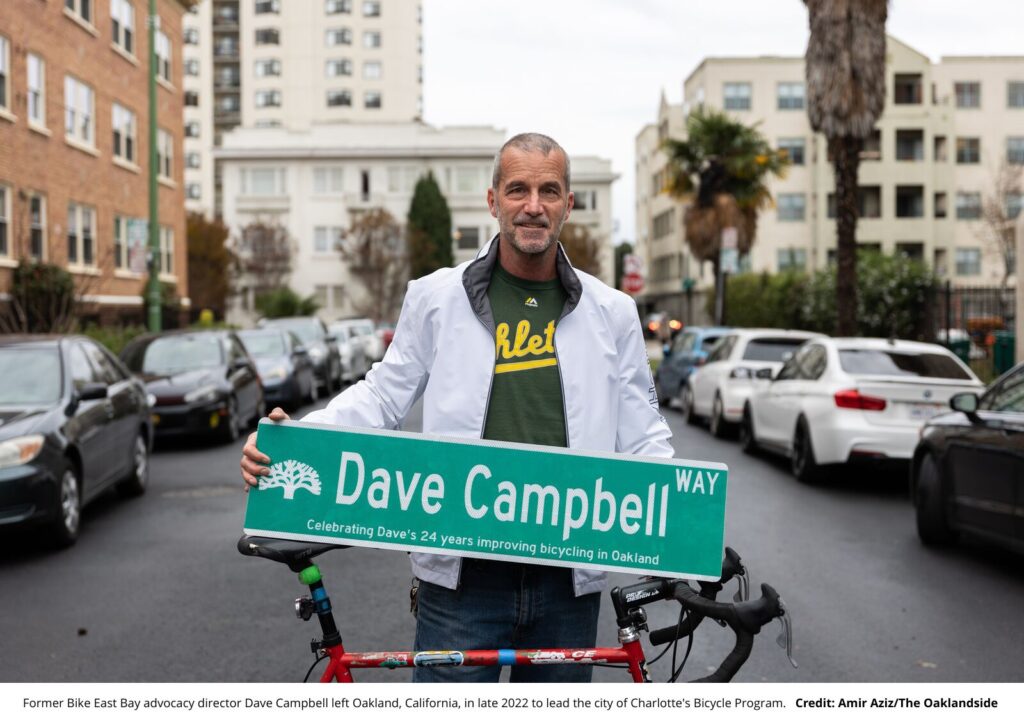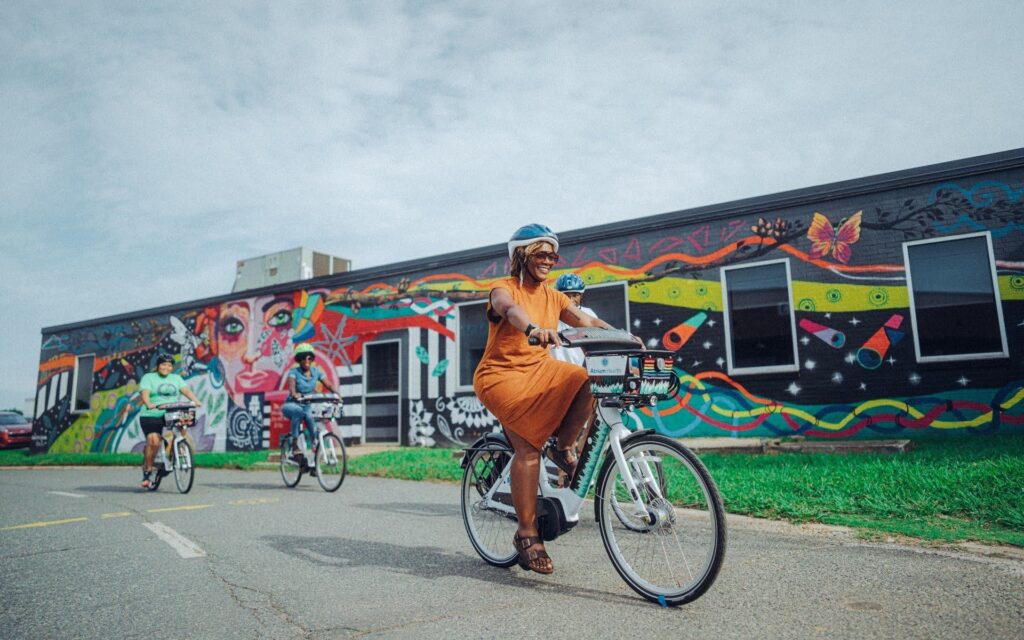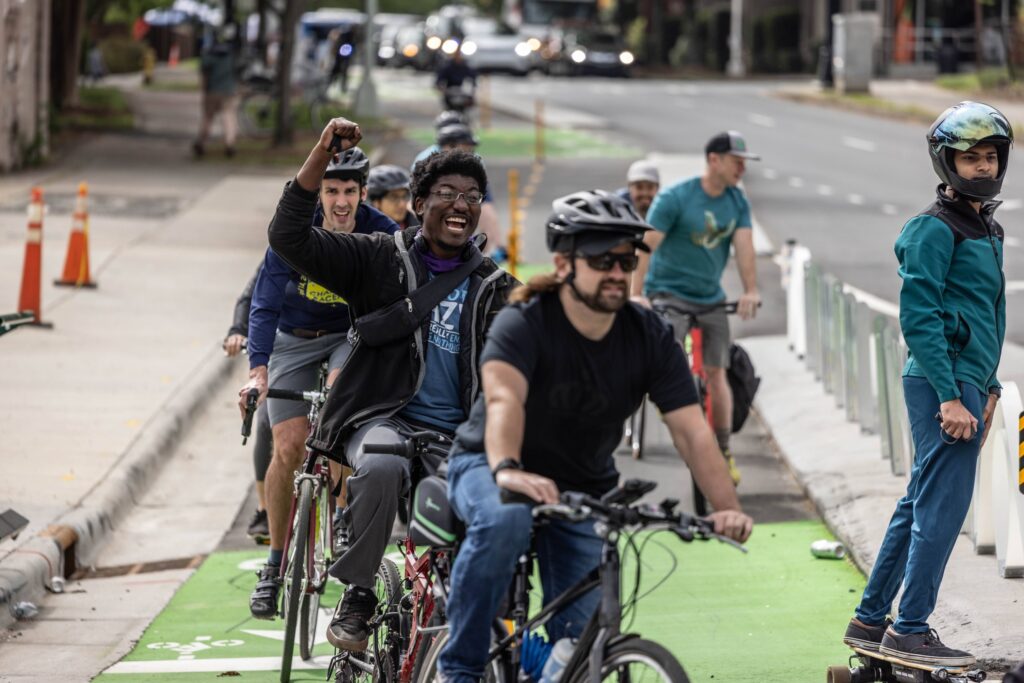7 Questions with Dave Campbell, Charlotte’s new bike planner

Charlotte has a new bicycle planner in town. Dave Campbell started his new job with the Charlotte Department of Transportation in December after a long advocacy career, including the last 10 years as advocacy director for Bike East Bay in California.
The publication The Oaklandside covered Campbell’s departure from the Bay Area, highlighting his work on equitable street investments, working on policy and even making advocacy approachable and fun — including making smoothies for kids on a blender strapped to his bike. As he mentioned to Streetsblog SF, he’s originally from the Southeast, and Charlotte is closer to family.
Needless to say, we welcome Dave’s arrival and look forward to working with him and others in the Charlotte Department of Transportation to improve the experience of people on bikes in the Queen City. We recently caught up with Dave and asked him a few questions.
Here are his answers!
Sustain Charlotte: Besides the lure of being closer to family in the Southeast, what appealed to you about going from an advocacy role to a government role related to bicycle safety?
Dave Campbell: A big goal of mine is to help further build a great bike network and figure out ways to do this sooner. I am always looking for ways to find safe space for bikes and explore how to make that space a reality more quickly. Working for a public agency, and in particular a large (transportation department) like CDOT, helps me focus on one urban area like Charlotte rather than advocating in front of 33 different cities.
Sustain: Can you please describe your new role? Generally, what are you responsible for? What does a typical day or week look like?
Campbell: I am in charge of the Bicycle Program at CDOT, and this generally includes all things bike related, from building that safe bike network I mentioned to encouragement and education activities. I will say this: CDOT is a higher functioning agency than any public works department or DOT we had in the Bay Area, which is why I like working here at CDOT, but one goal of mine is to make sure bicycling is part of what everyone at CDOT does, at some level. Improving bicycling should be institutionalized, and I think I can help continue to embed that knowledge in the organization. My typical days lately are listening and learning a lot. Please ask me this again in six months.
Sustain: On a personal level, what made you primarily use a bike to get around? And what made you decide to get into advocacy around cycling?

(Photo Credit: City of Charlotte)
Campbell: When I moved to Berkeley, California, back in the late 1990s, I naturally used my bike to get around because Berkeley is largely a grid city with short blocks. It just made sense. Oakland was a bit more of a challenge, but I worked it out. Before then, I mainly drove, like many people need to do.
I got into advocacy one day at a transportation fair in San Francisco, where I worked at the time as a lawyer, and someone put a bicycle-safety quiz in front of my face and said, “Test your knowledge of the rules of the road as they apply to bicycling.” I did and failed the quiz. I showed up at the next monthly meeting of Bike East Bay.
Sustain: Are there any lessons you learned in your advocacy roles that will help you in your new position with the city of Charlotte?
Campbell: For sure. When I meet, for example, with groups such as Sustain Charlotte or with members of the Bicycle Advisory Committee, I know where they are coming from. I have been there. With that experience, I think I can be more responsive and more helpful to how they want to be involved and help. We need an active community to make change.
Also, I have met a lot of planners and engineers of many types at different agencies, and it has been a different experience working with the variety of people in our field. One thing I learned is that as long as you appreciate the work they are doing and in the end can call them a friend, you will make progress together. I’ve learned how to yell, I’ve learned how to apologize, I’ve learned how to cooperate and I’ve learned how to compromise to get things done.
Sustain: You’ve been getting around Charlotte without a car since you got here in December. Can you talk about your experience so far? What are some of your initial observations about how Charlotte compares to the Bay Area for a person who doesn’t have a car?
Campbell: Charlotte’s roads are in much better shape than Oakland’s — by far. And there are more protected bike lanes in and around uptown here than there are in downtown Oakland. Drivers are not as crazy here, and I know that sounds crazy, but it’s the Wild West out west. But here, drivers do run over things more often, like signage and bollards. Transit is better in Oakland, but the bus network here is more intuitive, in my opinion. Charlotte stands out in how it has integrated more neighborhoods around light rail and around neighborhood greenways. Oakland just hasn’t figured that out yet. I love when businesses “face” toward transit and bikes. And did I mention how dang good the barbecue is here?!?
Sustain: What are some of the areas for improvement you’ve already identified in your short time here?

(Photo credit: City of Charlotte)
Campbell: Continuing to advance the Uptown CycleLink is a priority. Making better bike connections into west and east Charlotte are another top priority. The Corridors of Opportunity may be the next phase of outreach the bicycle program can help with — both to support that effort and to learn more about how safe streets are important to residents in transportation-disadvantaged neighborhoods outside of uptown.
Sustain: Charlotte has historically been a car-centric city. Many people have no desire to — or have been hesitant to — commute by bike. What’s your “elevator pitch” when encouraging folks to try it?
Campbell: First, Charlotte is like many places when it comes to cars. It’s part of America, and that story has been told many times. Most people I talk to and hear from say that they started bicycling either out of necessity or because a friend encouraged them. Their friends are our ambassadors. The best way to start is with kids and our greenways. There are few young kids I know who don’t want to ride a bike, even to school. Let’s support their parents. And let’s support those families by encouraging them to ride a greenway together one weekend.
Thanks for reading!
As a nonprofit, community support is essential for us to keep doing what we do — including providing free articles like this. If you found this article helpful, please consider supporting Sustain Charlotte so we can continue advocating for a better future and working with residents, neighborhood organizations, government agencies, nonprofits, and businesses to solve the most critical challenges to Charlotte’s long-term social, economic, and environmental health.
Want to stay in the loop? Subscribe to our free, weekly newsletter and follow us on Twitter, Facebook, and Instagram.
